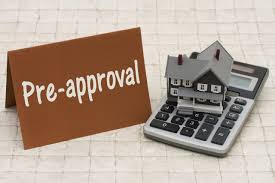Mortgage Pre-Approval: A Loan Must-Have for First-Time Home Buyers and Beyond
If you’re in the market for a mortgage, you probably know that lenders won’t just shower you with money when you show up at their office with a smile and a heart-warming story about how you saved for a down payment and found the perfect home after years of house hunting. Nope, they want to know that if they give you a home loan, odds are good you’ll pay them back. And that’s where mortgage pre-approval comes in. Here’s everything you need to know about this crucial stage in the home-buying process and how to ace it without a hitch.
What is mortgage pre-approval, anyway?
Mortgage pre-approval is that step in the mortgage application process where a lender probes deep into your financial past, checking out your income via W-2s, debt-to-income ratio, credit score, credit report, and other factors that help it determine whether or not to give you a mortgage loan—and how much money you stand to get. And that helps you set your sights on the right price range for a home.
“You need to know your buying power,” says Ray Rodriguez, New York City regional mortgage sales manager at TD Bank. Indeed, finding out your price range now can save you a lot of time and energy in the future.
“It’s emotionally crushing to find a home that you love and not be able to afford to purchase it,” he says.
Pre-approval vs. pre-qualification: What’s the difference?
Mortgage pre-qualification entails a basic overview of a borrower’s ability to get a loan. This goes for traditional loans, fixed-rate loans, and adjustable-rate loans. You provide a mortgage lender with information—about your down payment, income, assets, debts, and credit—but you don’t need to produce any paperwork like tax returns to back it up. As such, pre-qualification is relatively easy and can be a fast way to get a ballpark figure of what you can afford. But it’s by no means a guarantee that you’ll actually get approved for the loan when you go to buy a home.
Getting pre-approved for a mortgage application, in contrast, is a more in-depth process that involves a lender finding out your credit score, running a credit check, studying your debt-to-income ratio, understanding your down payment ability, and verifying your income and assets, says Rodriguez.
Then an underwriter does a preliminary review of your financial portfolio, including your down payment, and, if all goes well, issues a written commitment for financing up to a certain loan amount. This commitment is good for up to 90 or 120 days. So as long as you find your dream house and officially apply for your loan approval in that time period, you’re good to go!
Moreover, getting pre-approved for a home loan amount is typically free, says Staci Titsworth, regional manager of PNC Mortgage in Pittsburgh. Expect mortgage pre-approval to take, on average, one to three days for your application to be processed.
Why pre-approval is important
A letter of pre-approval from a mortgage lender is akin to a VIP ticket straight into a home seller’s heart. Why? It’s proof you are both willing and able to purchase real estate, and that you’ve passed credit report and credit score hurdles to prequalify. Consequently, many sellers will accept an offer only from a buyer who has been pre-approved, which makes sense given that without pre-approval, there’s basically no guarantee whatsoever that the deal will go through.
What documentation you need
To get pre-approved, you’ll need to provide a mortgage lender with a good amount of paperwork. For the typical home buyer, this includes the following:
Pay stubs from the past 30 days showing your year-to-date income
Two years of federal tax returns
Two years of W-2 forms from your employer
1099s if you are self-employed
Bank statements for the past two to three months
Statements (for the past quarter or 60 days) of all of your asset accounts, including checking and savings, as well as any investment accounts (e.g., CDs, IRAs, and other stocks or bonds)
Any other current real estate holdings
Residential history for the past two years, including landlord contact information if you rented
Proof of funds for the down payment, such as a bank account statement. If the cash is a gift from your parents, “you need to provide a letter that clearly states that the money is a gift and not a loan,” says Rodriguez.
Don’t make this pre-approval mistake!
Each time you apply for a new credit account—including a home mortgage loan—you trigger a “hard inquiry” on your credit report, which dings your credit score, says Bill Hardekopf, a credit expert at LowCards.com.
Your credit score can drop as little as a few points or up to 14 points, depending on your credit history and the number of other loans or credit accounts you’ve applied for in the past 90 days, says Jeremy David Schachter, mortgage adviser and branch manager at Pinnacle Capital Mortgage in Phoenix.
Because hard inquiries hurt your credit score, you will want to avoid applying for pre-approval with multiple lenders; otherwise, your score could decline to the point where you get locked out of buying real estate. (Your real estate agent can help make sure you don’t cross this line.) Still, it’s beneficial to meet with several lenders to explore your options conversationally, since some lenders offer more competitive interest rates and better service than others.

